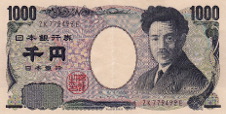
Example of a 1000 Yen bank note featuring Hideyo Noguchi (November 9, 1876 – May 21, 1928). Noguchi-san was a prominent Japanese bacteriologist who in 1911 discovered the agent of syphilis as the cause of progressive paralytic disease.
Japan is generally considered a cash society with the Japanese Yen being the currency of Japan. (The currency code for Yen is JPY, and the currency symbol is ¥.) Many of the smaller restaurants, boutiques and shops only accept Yen, while most, but not all, of the larger stores and restaurant chains will accept Yen or credit cards as a form of payment.
When purchasing items on base, you will find that it is much like the United States – credit cards, checks and U.S. dollars are accepted. However, there may be an occasional store on base where yen is accepted or required (Starbucks currently requests Yen).
Community Bank and Navy Federal Credit Union (NFCU) each have multiple ATMs on base that allow you to withdraw funds from your accounts. Community Bank ATMs dispense both Dollars and Yen. NFCU ATMs only dispense dollars. Some Japanese ATMs offer instructions in English and will allow you to draw cash advances on your credit cards. You will pay a small surcharge fee when you use an ATM affiliated with a financial institution where you do not have an account. It is suggested that you open an account with at least one of the on-base financial institutions.
To view top Yen (JPY) exchange rates, click below. Note that this is the official exchange rate and is not the rate that you will receive when you exchange dollars for yen at Community Bank, a bank or money exchange off-base, withdraw yen from an ATM, etc. Suggest you Google the “exchange rate in Yokosuka or Sasebo” for that information.
XE – Currency Encyclopedia
http://www.xe.com/currency/jpy-japanese-yen
Useful Japanese Phrases
Learning basic spoken Japanese is not as difficult as it may seem, despite how intimidating it may seem at first. There are several options for learning the language: Fleet and Family Support Center (FFSC) Workshops, on-base college courses, off-base language schools, computer based programs, and language exchanges (trade teaching English for Japanese). The Japanese people appreciate your attempts to speak their language. Below is a list of a few common phrases that can be used on a regular basis. Pronunciation of vowel sounds is consistent, but a bit different than you might be used to. Refer to the chart below for the correct vowel sounds.
NOTE: the (u) at the end of a word is pronounced as a short sound, almost silent, as if it has been cut off before it is completely spoken.
| VOWEL |
Sounds Like: |
In Sample Word |
| A |
ah |
Father |
| I |
ee |
See |
| U |
oo |
Too |
| E |
eh |
Met |
| O |
oh |
Vote |
- Good Morning
- Ohayou gozaimasu
- Good Afternoon
- Konnichiwa (pronounce BOTH “n” sounds!)
- Good Evening
- Konbanwa
- Good Night
- Oyasumi nasai
- Good Bye
- Sayounara
- How are you?
- Ogenki desu ka?
- Fine, thank you.
- Hai, genki desu.
- I’m pleased to meet you.
- Hajimemashite
- Nice to meet you.
- Douzo yoroshiku.
- What is your name?
- Onamae wa nan desu ka?
- My name is ____________.
- Watashi wa ____________.
- I don’t speak Japanese.
- Nihongo wo hanashimasen.
- Please say that again.
- Mou ichido itte kudasai.
- I am sorry.
- Gomen nasai.
- Do you speak English?
- Eigo wo hanashimasu ka?
- Do you understand?
- Wakarimasu ka?
- DYes, I understand.
- Hai, wakarimasu.
- Please (Here you are)
- Douzo
- Please give me.
- Kudasai
- Please do this for me
- Onegaishimasu
- Thank you
- Doumo arigatou gozaimasu
- You are welcome
- Douitashimashite (limited uses; it’s often better to say “thank you”)
- I like it
- Suki desu
- I don't like it
- Kirai desu
- See you later!
- Mata ne!
- Take care
- Kiotsukete! (the “u” is almost silent!)
- It’s OK, I don’t mind
- Daijoubu
- I’m leaving
- Itte kimasu!
- Have a nice day
- Itte rashai! (said to someone who is leaving)
- Please come in
- Agatte kudasai! (at a store, etc)
- Please come in
- Haitte kudasai! (a room)
- Please wait a moment
- Chotto matte kudasai!